情态动词复习课件
图片预览

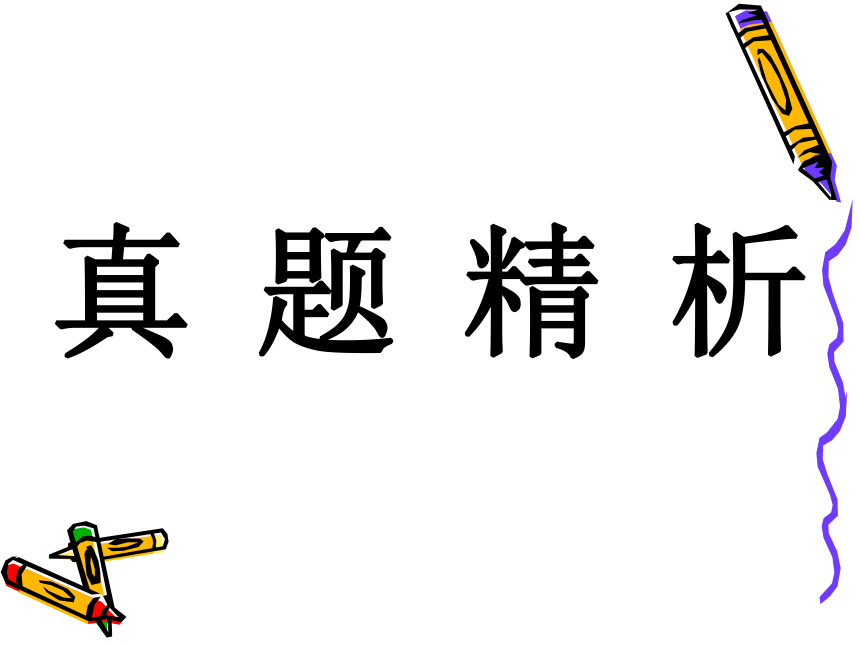
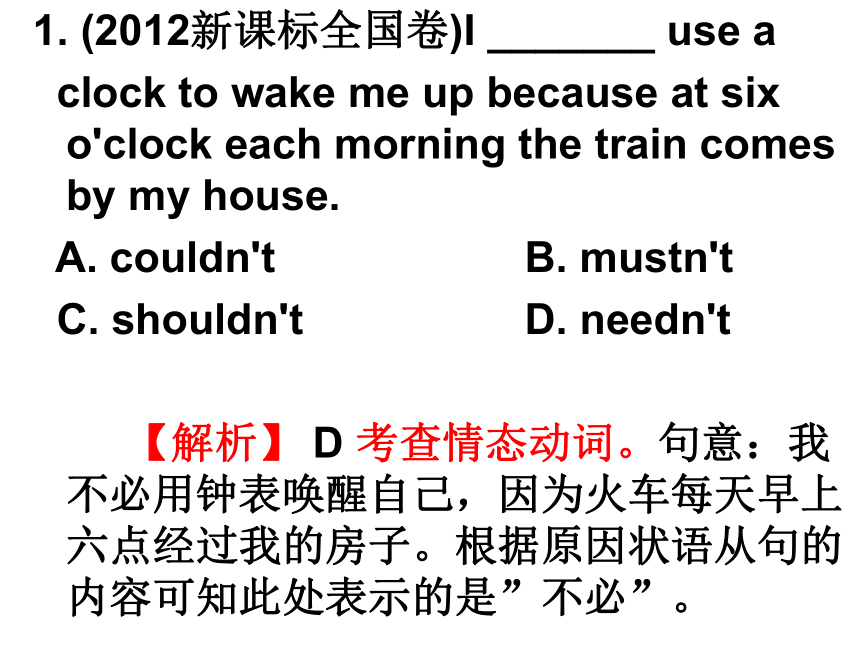
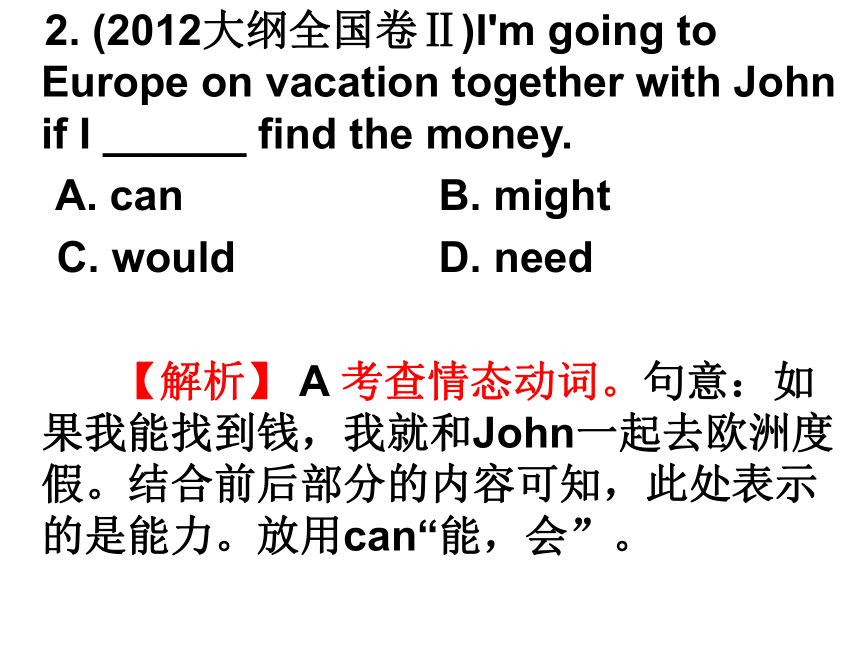
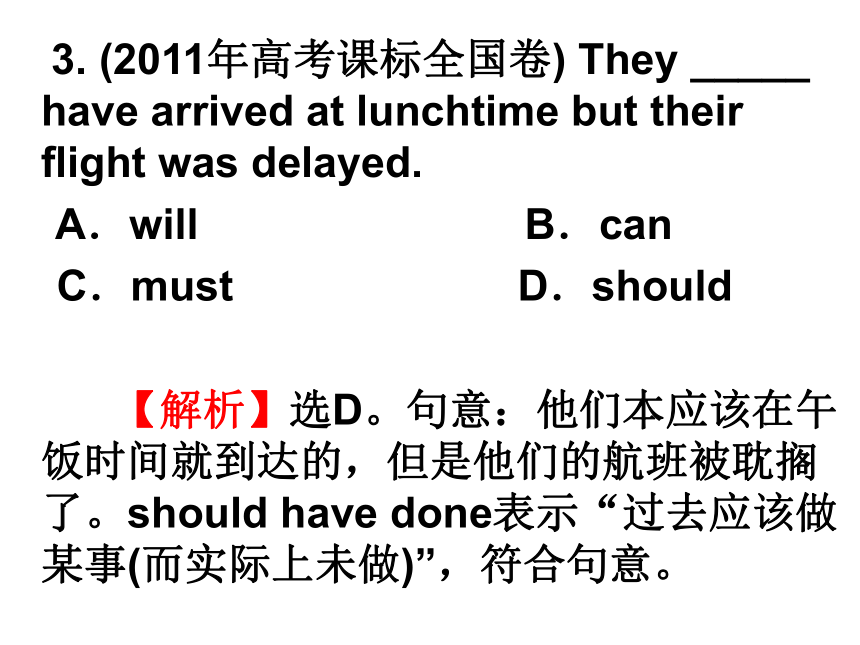
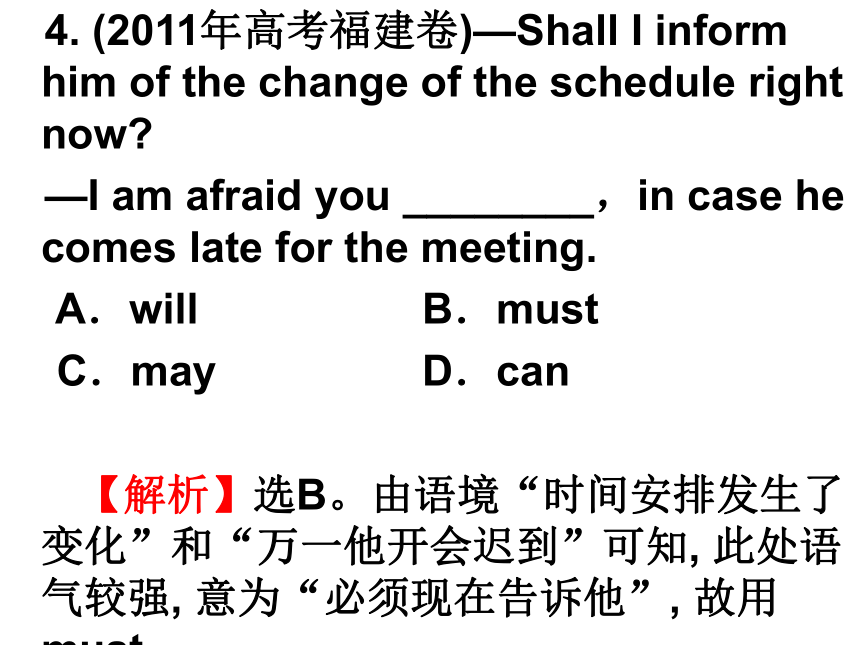
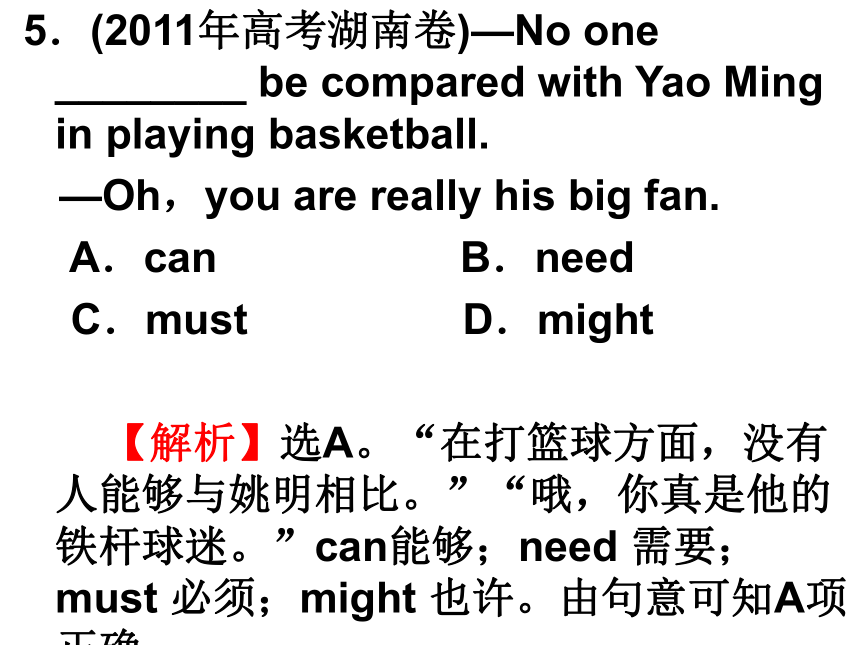
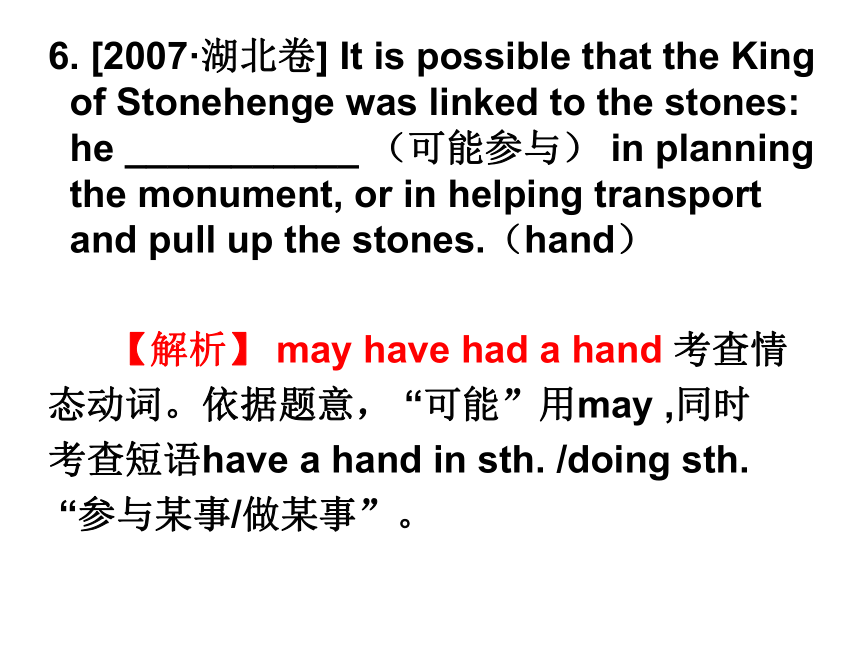
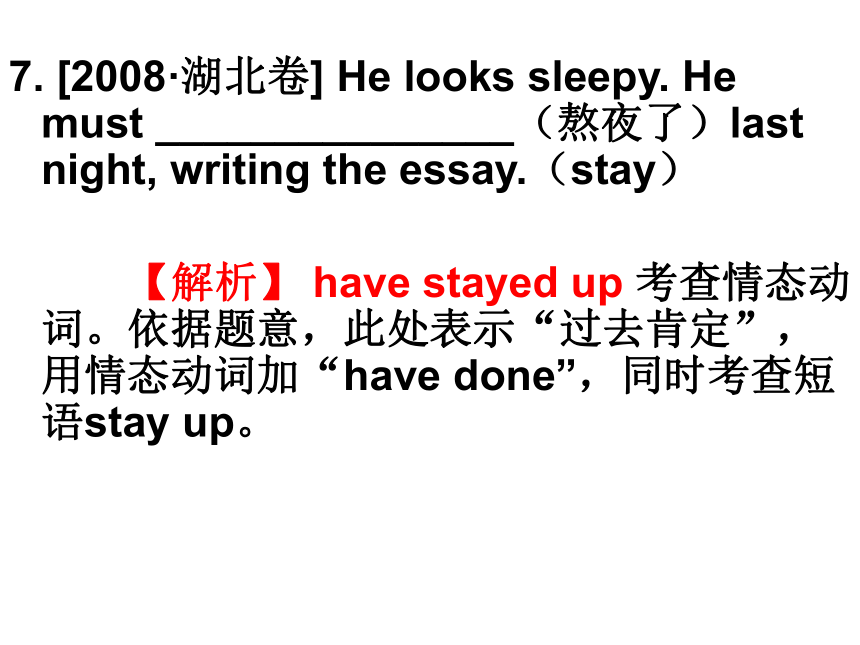
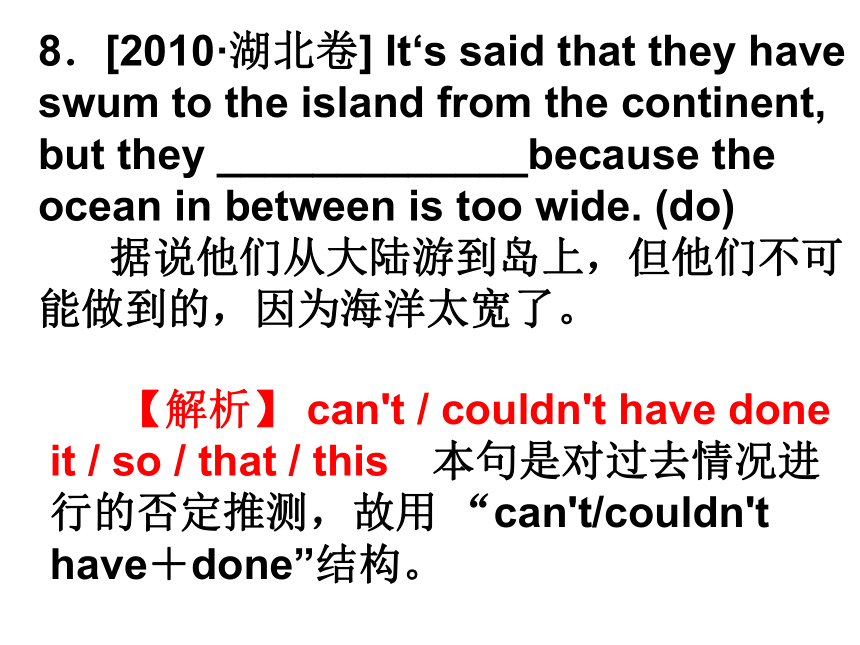
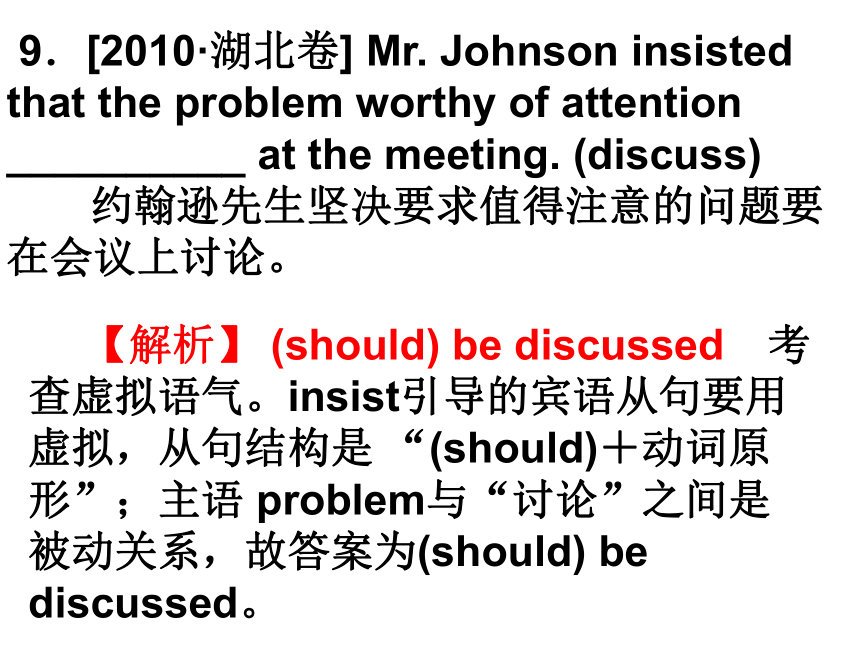
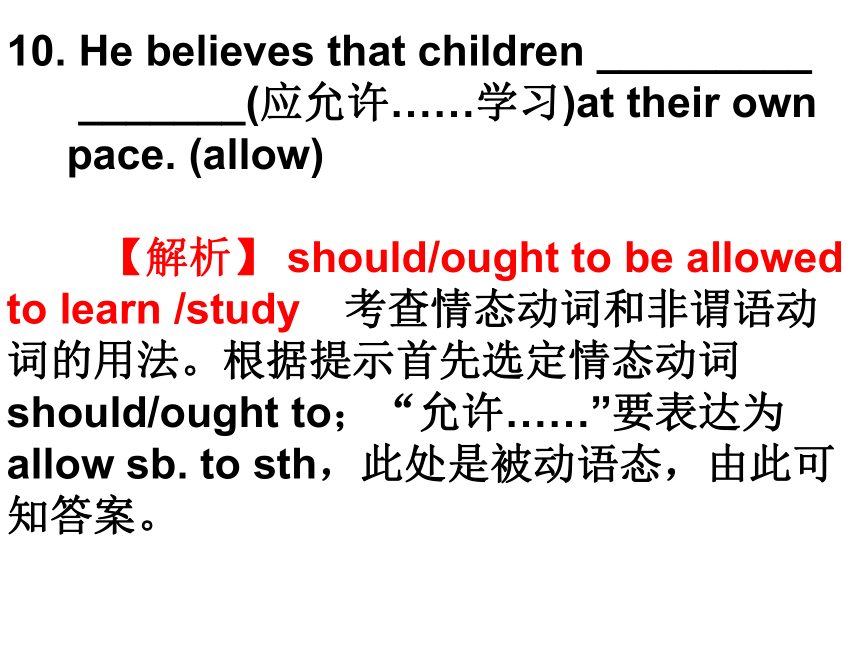
文档简介
课件89张PPT。第三讲情 态 动 词真 题 精 析 1. (2012新课标全国卷)I _______ use a
clock to wake me up because at six o'clock each morning the train comes by my house.
A. couldn't B. mustn't
C. shouldn't D. needn't
【解析】 D 考查情态动词。句意:我不必用钟表唤醒自己,因为火车每天早上六点经过我的房子。根据原因状语从句的内容可知此处表示的是”不必”。 2. (2012大纲全国卷Ⅱ)I'm going to Europe on vacation together with John if I ______ find the money.
A. can B. might
C. would D. need
【解析】 A 考查情态动词。句意:如果我能找到钱,我就和John一起去欧洲度假。结合前后部分的内容可知,此处表示的是能力。放用can“能,会”。 3. (2011年高考课标全国卷) They _____ have arrived at lunchtime but their flight was delayed.
A.will B.can
C.must D.should
【解析】选D。句意:他们本应该在午饭时间就到达的,但是他们的航班被耽搁了。should have done表示“过去应该做某事(而实际上未做)”,符合句意。 4. (2011年高考福建卷)—Shall I inform him of the change of the schedule right now?
—I am afraid you ________,in case he comes late for the meeting.
A.will B.must
C.may D.can
【解析】选B。由语境“时间安排发生了变化”和“万一他开会迟到”可知, 此处语气较强, 意为“必须现在告诉他”, 故用must。
5.(2011年高考湖南卷)—No one ________ be compared with Yao Ming in playing basketball.
—Oh,you are really his big fan.
A.can B.need
C.must D.might
【解析】选A。“在打篮球方面,没有人能够与姚明相比。”“哦,你真是他的铁杆球迷。”can能够;need 需要;must 必须;might 也许。由句意可知A项正确。
6. [2007·湖北卷] It is possible that the King of Stonehenge was linked to the stones: he ___________ (可能参与) in planning the monument, or in helping transport and pull up the stones.(hand)
【解析】 may have had a hand 考查情
态动词。依据题意, “可能”用may ,同时
考查短语have a hand in sth. /doing sth.
“参与某事/做某事”。7. [2008·湖北卷] He looks sleepy. He must _______________(熬夜了)last night, writing the essay.(stay)
【解析】 have stayed up 考查情态动词。依据题意,此处表示“过去肯定”,用情态动词加“have done”,同时考查短语stay up。
8.[2010·湖北卷] It‘s said that they have swum to the island from the continent, but they _____________because the ocean in between is too wide. (do)
据说他们从大陆游到岛上,但他们不可能做到的,因为海洋太宽了。 【解析】 can't / couldn't have done it / so / that / this 本句是对过去情况进行的否定推测,故用 “can't/couldn't have+done”结构。 9.[2010·湖北卷] Mr. Johnson insisted that the problem worthy of attention __________ at the meeting. (discuss)
约翰逊先生坚决要求值得注意的问题要在会议上讨论。 【解析】 (should) be discussed 考查虚拟语气。insist引导的宾语从句要用虚拟,从句结构是 “(should)+动词原形”;主语 problem与“讨论”之间是被动关系,故答案为(should) be discussed。10. He believes that children _________
_______(应允许……学习)at their own
pace. (allow)
【解析】 should/ought to be allowed to learn /study 考查情态动词和非谓语动词的用法。根据提示首先选定情态动词should/ought to;“允许……”要表达为allow sb. to sth,此处是被动语态,由此可知答案。
考 点 精 释什么是情态动词?
情态动词表示说话人的语气和情绪,本身词义不全,不能单独作谓语,后面必须与动词原形一起构成谓语。
情态动词没有人称和数的变化,有的情态动词有过去式。
常见的情态动词有can, could, may, might, must, have to, shall, should, will, would, ought to, need, dare, used to等。一、情态动词的基本用法
(一)can, could的用法
【完成例句】
(1)他妈妈会说法语。
His mother can / could speak French.
【结论1】表示体力或脑力(知识、技能)所产生的能力。【翻译句子】
(2)Man can / could not live without air.
人没有空气不能呼吸。
【结论2】 表示客观的可能性。【翻译句子】
(3) Could you wait a few days for the money?
钱你可以再等几天吗?
(4) Could you be here at eight o'clock tomorrow morning?
你能明天早上8点钟到这儿吗?
【结论3】表示请求、建议,用could 比 can语气更委婉(回答用原形)。【翻译句子】
(5)Could / Can I borrow your reference books?
我可以借下你的参考书吗?
(6)You can smoke in the entrance hall.
你可以在入口大厅抽烟。
【结论4】表示允许、许可,用could 比 can更委婉客气。【疑难1】
Can it be true?
You can't be serious!
Oh, dear, what on earth can this mean? 【疑难剖析1】 否定句、疑问句和感叹句中,can表示怀疑、惊异、不相信的态度。【疑难2】
They were able to put out the fire without any help from the firefighters. 【疑难剖析2】 表示“经过努力后终于能……”,用be able to。【疑难3】
You can not be too careful. 【疑难剖析3】惯用形式“can not (can't) … too / over / enough”表示“无论怎么……也不(过分)”,用来加强语气。 【疑难4】
I couldn't but choose to wait. 【疑难剖析4】 cannot but do sth. 不得不;只好(二)may, might的用法
【例句观察】
May I ask you a question?
Might I close the window?
【结论1】 表示允许、请求。Might I …? 比 May I …? 语气更委婉和有礼貌。【翻译句子】
(7) He might come tomorrow.
他可能明天来。
(8) He may be very busy these days.
他这些天可能很忙。
【结论2】表示可能性,表示“或许,大概”。用于肯定句或否定句中,用might 比 may语气更加不肯定。【疑难1】
Study hard so that you may work better in the future.
They set out early so that they might arrive in time. 【疑难剖析1】用于目的状语从句中,含“为了……”或“以便……”之意。【疑难2】
If that is the case, we may as well try.
Now that they were all here, she might as well speak her mind. 【疑难剖析2】 惯用形式 may / might as well+动词原形:不妨做……【疑难3】
May you succeed!
May the friendship between us last forever! 【疑难剖析3】表示祝愿。(不用might)采用部分倒装语序:may+主语+动词原形+……(三)must,have to的用法
【完成例句】
(9)所有人必须遵守条例。
Everybody must obey the rules.
(10)不准你和你妈妈那样说话。
You mustn't speak like that to your mother.
【结论1】must 表示“必须”。强调主观看法,只有现在时形式,否定式是must not (mustn't),表示“禁止”,“不准”。【翻译句子】
(11)走了很远的路你一定饿了。
You must be hungry after the long walk.
【结论2】must表示有把握的推测,意为“一定,肯定”,用于肯定句中。【翻译句子】
(12 )因为他的腿断了,他不得不躺在床上。
As he had broken his leg, he had to lie in bed.
【结论3】have to表示“必须,不得不”,着重强调客观需要,能用于更多时态(过去式和将来式)。【疑难】
— How old are you, madam?
— If you must know, I'm twice my son's age. 【疑难剖析】 must有“偏要、硬要”之意。(四)will, would的用法
【例句观察】
I will do my best to help you.
我会尽力帮你的。
He said that they would help us.
他说他们会帮助我们的。
【结论1】用于各种人称,表示意志或决心。will指现在,would则指过去。【完成例句】
(13)你可以教我怎样驾车吗?
Would you teach me how to drive a car?
(14)当你看见他能给他捎个便条吗?
Will you please give him a message when you see him?
【结论2】用于第二人称的疑问句中表示有礼貌的询问和请求,would 比 will更委婉。【完成例句】
(15)鱼没水就会死。
Fish will die without water.
(16)星期天当他在北京的时候就会来看我。
He would come to see me on Sunday when he was in Beijing.
【结论3】表示习惯性、经常性、倾向性,意为“总是”,“惯于”。 will指现在,would是指过去。【疑难1】
That will be the man you want to see.
Perhaps she would be willing to meet us.
【疑难剖析1】表示说话人的推测,意为“大概,也许”。would 的肯定性不如will强,语气比较弱。【疑难2】
That will do.
The machine won't work.
He tried the door again, but it wouldn't open.
【疑难剖析2】表示功能,译作“能”或“行”。【疑难3】
would 与used to 的区别:
We would sit in the yard every evening and listen to his story. (过去常有的习惯,但言下之意是现在可能还有这样的习惯。)
We used to sit in the yard every evening and listen to his story. (过去常有的习惯,但言下之意是现在没有这样的习惯了。)
There used to be a park here. 【疑难剖析3】 used to表示过去的某种习惯,现在已经没那样的习惯了;would 表示过去有某种习惯,现在可能还有。表示过去的状态,只能用used to,不能用would。(五)shall, should, ought to的用法
【翻译句子】
(17)我可以把灯关掉吗?
Shall I turn off the light?
【结论1】shall用于第一、第三人称作主语的疑问句中,表示征求对方的意见。【翻译句子】
(18) You should keep your promise.
你应该信守诺言。
【结论2】should意为“应该”,表义务、责任,也可表示劝告、建议。 【翻译句子】
(19)妈妈现在应该回来啦。
Mother should be back by now.
【结论3】 should表示按常规、常理推测,意为“可能”或“应该”。【翻译句子】
(20) I should think you are mistaken.
我倒认为你是错的。
【结论4】提出意见、建议时,可用should表示委婉、谦逊的语气,意为“可是”,“倒是”。【翻译句子】
(21)你应该在回家前完成作业。
You ought to finish your work before you go home.
【结论5】ought to表示责任和义务“应该”,语气比 should强;还可表推测。例如:
You have practiced for a long time. There ought to be no difficulty for you. 【疑难1】
You shall go with me.
You shall not leave your post.
【疑难剖析1】shall用于第二、第三人称作主语的陈述句中,表示说话人的决心、意志、许诺、命令、警告、威胁等。 【疑难2】
Why should you be so late?
你今天来得怎么这么晚?
How should I know?
我怎会知道? (意为:我不知道。)
【疑难剖析2】Why / How +should结构表示说话人对某事不能理解,感到意外、惊异等意思,意为“竟会”。(六)need的用法
【例句观察】
You needn't water the tomato plants now.
— Need he come now?
— Yes, he must. / No, he needn‘t. / he doesn’t have to.
【结论1】need作情态动词表示“需要”,“必要”。通常用于否定句、疑问句、条件句中,且只有现在时,其他时态用“have to”的相应形式代替。【翻译句子】
(22) The house needs repairing.
=The house needs to be repaired.
房子需要修理。
【结论2】need还可以用作行为动词,其变化和一般的动词相同。若主语为动作承受者时, 用动词主动形式表示被动意义, 或用不定式的被动形式。【疑难1】
— Must I finish my homework now?
— No, you needn't.
【疑难剖析1】“Must…?”一般疑问句的否定回答要用:No, sb. needn't. (七)dare的用法
【翻译句子】
(23) She dare not go there.
她不敢去那儿。
(24) How dare she do such a thing?
她怎敢做那样的事情?
【结论1】 dare作情态动词表示“敢于”用于否定句、疑问句和条件句中。【翻译句子】
(25) I dare say he is right.
我想他大概是对的吧。
【结论2】 惯用短语“I dare say”意为“我想,大概”。 【翻译句子】
(26) 你敢往海里跳吗?
Do you dare to jump into the ocean?
(27) 我不敢问她。
I don't dare (to) ask her.
【结论3】dare还可以用作行为动词,其变化与一般动词相同。 (在否定句中时,dare后的“to+动词原形”可以省略to)。二、情态动词的特殊用法
情态动词除各自有自己的词义外,还可以表示猜测和责备(虚拟)等意义。情态动词表推测用法can / must / may / should这四个情态动词可以用于推测,可以对现在状态、现在正在进行的动作、过去已经发生的动作或对将来发生的动作进行推测。(一)对现在状态、现在正在进行的动作的推测,用“情态动词+动词原形”结构。
1. can
【完成例句】
(28) 他在住院,他不可能在校学习。
He is in hospital. He can't be at school.
(29) 英语课开始了,他们不可能在打网球。
English class has begun. They can not be playing tennis now.
【结论1】否定句:意为“不可能”。【完成例句】
(30) Can he have been to America?
他会不会去过美国?
【结论2】疑问句:意为“会不会”。 2. may
【完成例句】
(31)他可能坐车来,但我不确定。
He may come by car, but I am not sure.
(32)他们在上体育课。男孩们可能正在打球。
They are having PE. Boys may be playing basketball.
【结论1】肯定句:意为“也许,可能”(might 的可能性更小)【完成例句】
(33)没有人来接电话,他可能不在家。
No one comes to answer the phone. He may not be at home.
【结论2】否定句:意为“也许不 / 没有,可能不 / 没有” (注意与can't 否定猜测时意思的对比)。3. must
【完成例句】
(34)地面是湿的,昨天晚上肯定下过雨。
The ground is wet. It must have rained last night.
【结论】只能用于“肯定句”表示猜测,意为:“肯定,必定”(=I am sure that…)4. should, ought to
【例句观察】
It's spring now. It should be warm.
现在是春天了,应该暖和点了。
The new coat ought to be ready on Thursday.
新外套到礼拜四应该能准备好了。
【结论】 肯定句 “理应,应当”(按常规、常理、风俗习惯等进行推测)。(二)对过去所发生的事情的推测,用“情态动词+完成式”结构。
【完成例句】
(35)房间里没有灯光,他们肯定已经上床睡觉了。
There's no light in the room. They must have gone to bed.
【结论1】must have done 一定做过某事。【完成例句】
(36)他昨天不可能住酒店,他住在我家。
He couldn't have lived in the hotel because he stayed with me in my house.
【结论2】can have done / cannot have done表示对过去所发生的行为的怀疑和不肯定,通常用在否定句和疑问句中。【翻译句子】
(37)你本来可以把工作做得更好一些的。
You could have done the work better.
【结论3】 could have done本来可以做而实际上未做。【完成例句】
(38)他也许可以给你更多的帮助,尽管他很忙。
He might have given you more help, even though he was very busy.
【结论4】may / might have done也许 / 或许已经……;本来可能……(但实际上没有发生);本来应该或可以做某事(含有轻微的责备语气)。【翻译句子】
(39)你本应该更加仔细地做这个练习。
You should / ought to have done the exercise more carefully.
【结论5】should / ought to have done
本来应该做而实际上未做。(有“弦外之音,言外之意”。事实上,动作在过去并未发生过。)而ought not to have done; shouldn't have done表示“本来不应该做而实际上做了”。【完成例句】
(40)你本来不必来校上课,因为今天是星期天。
Today is Sunday. You needn't have come to school for lessons.
【结论6】needn't have done 本来没必要做而实际上做了。【疑难1】
You must go now, needn't you?
You mustn't smoke here, must / may you?
【疑难剖析1】
当must作“必须”意义时,其反义部分用needn't;
当含有mustn't时,其反意部分用must / may。【疑难2】
You must be hungry now, aren't you?
You must have heard about it, haven't you?
You must have watched that football match last night, didn't you?
【疑难剖析2】当情态动词表推测时,反义部分的动词形式根据情态动词后面所隐含的时间来确定。习 题 精 练 1. We ______ have bought so much food now that Suzie won't be with us for dinner.
A. may not B. needn't
C. can't D. mustn't
【解析】 B 考查情态动词。句意:既然Suzie不和我们一起吃晚饭,那我们就没有必要买这么多食物。根据题意可知选B,needn't have done表示“本没有必要做某事而实际上却做了。 ” 2. We ______ the difficulty together, but why didn't you tell me?
A. should face B. might face
C. could have faced D. must have faced
【解析】 C 考查情态动词。句意:我们本可以共同面对困难,可你为什么不告诉我呢?后半句用的一般过去时,由此可知前半句是对过去情况的推测,所以用“情态动词+ have done”形式,表示过去本可以做某事,而实际上却没有做,符合句意。 3. — _______ you interrupt me now?
Can't you see I'm on the phone?
— Sorry Sir, but it's urgent.
A. Can B. Should
C. Must D. Would
【解析】 C 考查情态动词。句意:——你偏要现在打扰我吗?难道你没有看到我正在打电话吗?——对不起,先生,但是情况太紧急了。must表示”偏要,硬要”,故选C项。
4. I ______ thank you too much for all your help to my son while we were away from home.
A. won't B. can't
C. can D. will
【解析】 B 考查情态动词。句意:我们不在家时,你对我儿子的帮助,我怎样感谢你都不过分。can't...too much表示“无论怎样……也不过分”。 5. It's quite warm here; we______ turn the heating on yet.
A. couldn't B. mustn't
C. needn't D. wouldn't
【解析】 C 考查情态动词。句意:这里相当暖和,我们没有必要还开着暖气。needn't “不必”;couldn’t“不能”;mustn't“禁止”;wouldn't“不肯,不会”。根据句意可知选C。 6.One of our rules is that every student ______ wear school uniform while at school.
A. might B. could
C. shall D. will
【解析】 C 考查情态动词。句意:我们的一条规则就是,每个学生在校期阔都必须穿校服。shall用于第三人称,在条约、规定、法令等文件中表示命令或规定,故选C。本题易误选D。但will表示单纯的将来,故可排除。
7. I got close enough to hear them speaking Chinese, and I said "Ni Hao," just as I ______ do in China.
A. must B. might
C. can D. should
【解析】 B 考查情态动词。句意:我靠近他们,听见他们在讲汉语。我对他们说了声“你好!”就像我在中国做的那样。might表示一种可能性。 8.—I don’t really like James. Why did you invite him?
—Don’t worry. He ________ come. He said he wasn’t certain what his plans were.
A.must not B.need not
C.would not D.might not
【解析】选D。根据答语“Don’t worry.”可知,此处应该表示“或许不来”。
9. —Will you read me a story,Mummy?
—OK. You ________ have one if you go to bed as soon as possible.
A.might B.must
C.could D.shall
【解析】选D。句意: “妈妈, 你能给我读个故事吗?”“好的。如果你尽快上床睡觉你就会听到一个故事。”shall用于二、三人称陈述句中,表示说话人给对方命令、警告、允诺或威胁等。此处shall表示“允诺”。
10.It ________ be the postman at the
door. It’s only six o’clock.
A.mustn’t B.can’t
C.won’t D.needn’t
【解析】选B。句意: “不可能是邮递员在门口,现在还是六点钟”, can’t表示否定猜测,意为“不可能”。
11.—What’s that terrible smell?
—Oh,I forgot about the chicken! Go and look,it ____________!(burn)
“那是什么可怕的气味?”“哦,我忘了鸡肉!去看看,一定是烧着了!”
【解析】must be burning 考查情态动词表推测。根据题目上下文提示可知,此题是对正在发生的情况的推测,并且可能性非常大,因此用must be doing结构。12.You ________________that letter to James. However, you didn't. (write)
你本应该给詹姆斯写信,然而,你没写。
【解析】ought to/should have written 考查情态动词表推测。根据题目的中英文意思,可知此题是对过去发生的情况的推测,因此用ought to/should have done结构。
10.You ________________________ the ice box. I expect it has become undrinkable. (put)
你本该把牛奶放到冰盒里。我想现在这牛奶不能喝了。
【解析】should have put the milk into 考查情态动词的用法。根据题目的中英文含义,可知此题是对过去发生的情况的推测,因此用should have done结构。
13. You __________________, which will lead to health problems. (fry)
你不要吃太多炸鸡,它会导致你的健康问题。
【解析】mustn't eat too much fried chicken 考查情态动词mustn't,表示“不准”或“不许”。“被油炸的或炒的食品”称作fried,如:fried fish/noodles。 14. The man was wearing such strange clothes that you __________________
easily. (pick)
那个男人穿着如此怪异,以至于你很容易就认出了他。
【解析】 could pick him out 考查情态动词的用法。结果状语从句中要求用 can / could; 同时考查词法搭配:pick out认出。
15.My MP4 player isn’t in my bag. Where ________________________ it ? (put)
我的MP4不在我的包里,我可能把它放在哪里了呢?
【解析】 can I have put 考查“情态动词+完成式”。依据题意,应该表示对过去发生的事情的推测,并且可能性不是很大。16. My husband ______________. The sweater that used to fit him well is now too tight for him. (gain)
我丈夫一定是长胖了. 这件过去适合他的运动衫现在太紧了.
【解析】 must have gained weight 考查“情态动词+完成式”。 表示“可能性非常大,肯定”应用must;由于是对过去情况的推测,动词应该使用完成式。
17.I did not know his telephone number otherwise I __________________. (telephone)
我不知道他的电话号码,否则我就会给他打电话。
【解析】 would have telephoned him 考查情态动词表推测。根据题目中的时间提示可知,此题是对过去发生的情况的推测,并且表示过去将可能发生,因此用would have done结构。
18.John's score on the test is the highest in the class; he ________________ last night. (study)
约翰的考试分数全班最高;他昨天晚上一定学习了。
【解析】 must have studied 考查情态动词表推测。根据题目中的时间提示,可知此题是对过去发生的情况的推测,因此用must have done结构。 19.When Xu Bingyu graduated from college in 2003, he chose to teach in a mountainous area of Guizhou Province when he ____________ an easy city life. (enjoy)
当许冰雨2003年大学毕业时,他选择到贵州省的山区教书,尽管他本可以享受安逸的城市生活。
【解析】 could have enjoyed考查情态动词表推测。根据题目中的时间提示可知,此题是对过去发生的情况的推测,并且可能性不大,因此用could have done结构。
20.You are such a lover of iPhone, so I believe that ____________________ Steve Jobs' death.(mourn)
你如此地喜欢iPhone,我相信对斯蒂夫?乔布斯的去世,你一定难过。
【解析】 you must have mourned for
考查情态动词表推测。根据题目中的时间提
示,可知此题是对过去发生的情况的推测,因
此用must have done结构。
Bye-bye!
clock to wake me up because at six o'clock each morning the train comes by my house.
A. couldn't B. mustn't
C. shouldn't D. needn't
【解析】 D 考查情态动词。句意:我不必用钟表唤醒自己,因为火车每天早上六点经过我的房子。根据原因状语从句的内容可知此处表示的是”不必”。 2. (2012大纲全国卷Ⅱ)I'm going to Europe on vacation together with John if I ______ find the money.
A. can B. might
C. would D. need
【解析】 A 考查情态动词。句意:如果我能找到钱,我就和John一起去欧洲度假。结合前后部分的内容可知,此处表示的是能力。放用can“能,会”。 3. (2011年高考课标全国卷) They _____ have arrived at lunchtime but their flight was delayed.
A.will B.can
C.must D.should
【解析】选D。句意:他们本应该在午饭时间就到达的,但是他们的航班被耽搁了。should have done表示“过去应该做某事(而实际上未做)”,符合句意。 4. (2011年高考福建卷)—Shall I inform him of the change of the schedule right now?
—I am afraid you ________,in case he comes late for the meeting.
A.will B.must
C.may D.can
【解析】选B。由语境“时间安排发生了变化”和“万一他开会迟到”可知, 此处语气较强, 意为“必须现在告诉他”, 故用must。
5.(2011年高考湖南卷)—No one ________ be compared with Yao Ming in playing basketball.
—Oh,you are really his big fan.
A.can B.need
C.must D.might
【解析】选A。“在打篮球方面,没有人能够与姚明相比。”“哦,你真是他的铁杆球迷。”can能够;need 需要;must 必须;might 也许。由句意可知A项正确。
6. [2007·湖北卷] It is possible that the King of Stonehenge was linked to the stones: he ___________ (可能参与) in planning the monument, or in helping transport and pull up the stones.(hand)
【解析】 may have had a hand 考查情
态动词。依据题意, “可能”用may ,同时
考查短语have a hand in sth. /doing sth.
“参与某事/做某事”。7. [2008·湖北卷] He looks sleepy. He must _______________(熬夜了)last night, writing the essay.(stay)
【解析】 have stayed up 考查情态动词。依据题意,此处表示“过去肯定”,用情态动词加“have done”,同时考查短语stay up。
8.[2010·湖北卷] It‘s said that they have swum to the island from the continent, but they _____________because the ocean in between is too wide. (do)
据说他们从大陆游到岛上,但他们不可能做到的,因为海洋太宽了。 【解析】 can't / couldn't have done it / so / that / this 本句是对过去情况进行的否定推测,故用 “can't/couldn't have+done”结构。 9.[2010·湖北卷] Mr. Johnson insisted that the problem worthy of attention __________ at the meeting. (discuss)
约翰逊先生坚决要求值得注意的问题要在会议上讨论。 【解析】 (should) be discussed 考查虚拟语气。insist引导的宾语从句要用虚拟,从句结构是 “(should)+动词原形”;主语 problem与“讨论”之间是被动关系,故答案为(should) be discussed。10. He believes that children _________
_______(应允许……学习)at their own
pace. (allow)
【解析】 should/ought to be allowed to learn /study 考查情态动词和非谓语动词的用法。根据提示首先选定情态动词should/ought to;“允许……”要表达为allow sb. to sth,此处是被动语态,由此可知答案。
考 点 精 释什么是情态动词?
情态动词表示说话人的语气和情绪,本身词义不全,不能单独作谓语,后面必须与动词原形一起构成谓语。
情态动词没有人称和数的变化,有的情态动词有过去式。
常见的情态动词有can, could, may, might, must, have to, shall, should, will, would, ought to, need, dare, used to等。一、情态动词的基本用法
(一)can, could的用法
【完成例句】
(1)他妈妈会说法语。
His mother can / could speak French.
【结论1】表示体力或脑力(知识、技能)所产生的能力。【翻译句子】
(2)Man can / could not live without air.
人没有空气不能呼吸。
【结论2】 表示客观的可能性。【翻译句子】
(3) Could you wait a few days for the money?
钱你可以再等几天吗?
(4) Could you be here at eight o'clock tomorrow morning?
你能明天早上8点钟到这儿吗?
【结论3】表示请求、建议,用could 比 can语气更委婉(回答用原形)。【翻译句子】
(5)Could / Can I borrow your reference books?
我可以借下你的参考书吗?
(6)You can smoke in the entrance hall.
你可以在入口大厅抽烟。
【结论4】表示允许、许可,用could 比 can更委婉客气。【疑难1】
Can it be true?
You can't be serious!
Oh, dear, what on earth can this mean? 【疑难剖析1】 否定句、疑问句和感叹句中,can表示怀疑、惊异、不相信的态度。【疑难2】
They were able to put out the fire without any help from the firefighters. 【疑难剖析2】 表示“经过努力后终于能……”,用be able to。【疑难3】
You can not be too careful. 【疑难剖析3】惯用形式“can not (can't) … too / over / enough”表示“无论怎么……也不(过分)”,用来加强语气。 【疑难4】
I couldn't but choose to wait. 【疑难剖析4】 cannot but do sth. 不得不;只好(二)may, might的用法
【例句观察】
May I ask you a question?
Might I close the window?
【结论1】 表示允许、请求。Might I …? 比 May I …? 语气更委婉和有礼貌。【翻译句子】
(7) He might come tomorrow.
他可能明天来。
(8) He may be very busy these days.
他这些天可能很忙。
【结论2】表示可能性,表示“或许,大概”。用于肯定句或否定句中,用might 比 may语气更加不肯定。【疑难1】
Study hard so that you may work better in the future.
They set out early so that they might arrive in time. 【疑难剖析1】用于目的状语从句中,含“为了……”或“以便……”之意。【疑难2】
If that is the case, we may as well try.
Now that they were all here, she might as well speak her mind. 【疑难剖析2】 惯用形式 may / might as well+动词原形:不妨做……【疑难3】
May you succeed!
May the friendship between us last forever! 【疑难剖析3】表示祝愿。(不用might)采用部分倒装语序:may+主语+动词原形+……(三)must,have to的用法
【完成例句】
(9)所有人必须遵守条例。
Everybody must obey the rules.
(10)不准你和你妈妈那样说话。
You mustn't speak like that to your mother.
【结论1】must 表示“必须”。强调主观看法,只有现在时形式,否定式是must not (mustn't),表示“禁止”,“不准”。【翻译句子】
(11)走了很远的路你一定饿了。
You must be hungry after the long walk.
【结论2】must表示有把握的推测,意为“一定,肯定”,用于肯定句中。【翻译句子】
(12 )因为他的腿断了,他不得不躺在床上。
As he had broken his leg, he had to lie in bed.
【结论3】have to表示“必须,不得不”,着重强调客观需要,能用于更多时态(过去式和将来式)。【疑难】
— How old are you, madam?
— If you must know, I'm twice my son's age. 【疑难剖析】 must有“偏要、硬要”之意。(四)will, would的用法
【例句观察】
I will do my best to help you.
我会尽力帮你的。
He said that they would help us.
他说他们会帮助我们的。
【结论1】用于各种人称,表示意志或决心。will指现在,would则指过去。【完成例句】
(13)你可以教我怎样驾车吗?
Would you teach me how to drive a car?
(14)当你看见他能给他捎个便条吗?
Will you please give him a message when you see him?
【结论2】用于第二人称的疑问句中表示有礼貌的询问和请求,would 比 will更委婉。【完成例句】
(15)鱼没水就会死。
Fish will die without water.
(16)星期天当他在北京的时候就会来看我。
He would come to see me on Sunday when he was in Beijing.
【结论3】表示习惯性、经常性、倾向性,意为“总是”,“惯于”。 will指现在,would是指过去。【疑难1】
That will be the man you want to see.
Perhaps she would be willing to meet us.
【疑难剖析1】表示说话人的推测,意为“大概,也许”。would 的肯定性不如will强,语气比较弱。【疑难2】
That will do.
The machine won't work.
He tried the door again, but it wouldn't open.
【疑难剖析2】表示功能,译作“能”或“行”。【疑难3】
would 与used to 的区别:
We would sit in the yard every evening and listen to his story. (过去常有的习惯,但言下之意是现在可能还有这样的习惯。)
We used to sit in the yard every evening and listen to his story. (过去常有的习惯,但言下之意是现在没有这样的习惯了。)
There used to be a park here. 【疑难剖析3】 used to表示过去的某种习惯,现在已经没那样的习惯了;would 表示过去有某种习惯,现在可能还有。表示过去的状态,只能用used to,不能用would。(五)shall, should, ought to的用法
【翻译句子】
(17)我可以把灯关掉吗?
Shall I turn off the light?
【结论1】shall用于第一、第三人称作主语的疑问句中,表示征求对方的意见。【翻译句子】
(18) You should keep your promise.
你应该信守诺言。
【结论2】should意为“应该”,表义务、责任,也可表示劝告、建议。 【翻译句子】
(19)妈妈现在应该回来啦。
Mother should be back by now.
【结论3】 should表示按常规、常理推测,意为“可能”或“应该”。【翻译句子】
(20) I should think you are mistaken.
我倒认为你是错的。
【结论4】提出意见、建议时,可用should表示委婉、谦逊的语气,意为“可是”,“倒是”。【翻译句子】
(21)你应该在回家前完成作业。
You ought to finish your work before you go home.
【结论5】ought to表示责任和义务“应该”,语气比 should强;还可表推测。例如:
You have practiced for a long time. There ought to be no difficulty for you. 【疑难1】
You shall go with me.
You shall not leave your post.
【疑难剖析1】shall用于第二、第三人称作主语的陈述句中,表示说话人的决心、意志、许诺、命令、警告、威胁等。 【疑难2】
Why should you be so late?
你今天来得怎么这么晚?
How should I know?
我怎会知道? (意为:我不知道。)
【疑难剖析2】Why / How +should结构表示说话人对某事不能理解,感到意外、惊异等意思,意为“竟会”。(六)need的用法
【例句观察】
You needn't water the tomato plants now.
— Need he come now?
— Yes, he must. / No, he needn‘t. / he doesn’t have to.
【结论1】need作情态动词表示“需要”,“必要”。通常用于否定句、疑问句、条件句中,且只有现在时,其他时态用“have to”的相应形式代替。【翻译句子】
(22) The house needs repairing.
=The house needs to be repaired.
房子需要修理。
【结论2】need还可以用作行为动词,其变化和一般的动词相同。若主语为动作承受者时, 用动词主动形式表示被动意义, 或用不定式的被动形式。【疑难1】
— Must I finish my homework now?
— No, you needn't.
【疑难剖析1】“Must…?”一般疑问句的否定回答要用:No, sb. needn't. (七)dare的用法
【翻译句子】
(23) She dare not go there.
她不敢去那儿。
(24) How dare she do such a thing?
她怎敢做那样的事情?
【结论1】 dare作情态动词表示“敢于”用于否定句、疑问句和条件句中。【翻译句子】
(25) I dare say he is right.
我想他大概是对的吧。
【结论2】 惯用短语“I dare say”意为“我想,大概”。 【翻译句子】
(26) 你敢往海里跳吗?
Do you dare to jump into the ocean?
(27) 我不敢问她。
I don't dare (to) ask her.
【结论3】dare还可以用作行为动词,其变化与一般动词相同。 (在否定句中时,dare后的“to+动词原形”可以省略to)。二、情态动词的特殊用法
情态动词除各自有自己的词义外,还可以表示猜测和责备(虚拟)等意义。情态动词表推测用法can / must / may / should这四个情态动词可以用于推测,可以对现在状态、现在正在进行的动作、过去已经发生的动作或对将来发生的动作进行推测。(一)对现在状态、现在正在进行的动作的推测,用“情态动词+动词原形”结构。
1. can
【完成例句】
(28) 他在住院,他不可能在校学习。
He is in hospital. He can't be at school.
(29) 英语课开始了,他们不可能在打网球。
English class has begun. They can not be playing tennis now.
【结论1】否定句:意为“不可能”。【完成例句】
(30) Can he have been to America?
他会不会去过美国?
【结论2】疑问句:意为“会不会”。 2. may
【完成例句】
(31)他可能坐车来,但我不确定。
He may come by car, but I am not sure.
(32)他们在上体育课。男孩们可能正在打球。
They are having PE. Boys may be playing basketball.
【结论1】肯定句:意为“也许,可能”(might 的可能性更小)【完成例句】
(33)没有人来接电话,他可能不在家。
No one comes to answer the phone. He may not be at home.
【结论2】否定句:意为“也许不 / 没有,可能不 / 没有” (注意与can't 否定猜测时意思的对比)。3. must
【完成例句】
(34)地面是湿的,昨天晚上肯定下过雨。
The ground is wet. It must have rained last night.
【结论】只能用于“肯定句”表示猜测,意为:“肯定,必定”(=I am sure that…)4. should, ought to
【例句观察】
It's spring now. It should be warm.
现在是春天了,应该暖和点了。
The new coat ought to be ready on Thursday.
新外套到礼拜四应该能准备好了。
【结论】 肯定句 “理应,应当”(按常规、常理、风俗习惯等进行推测)。(二)对过去所发生的事情的推测,用“情态动词+完成式”结构。
【完成例句】
(35)房间里没有灯光,他们肯定已经上床睡觉了。
There's no light in the room. They must have gone to bed.
【结论1】must have done 一定做过某事。【完成例句】
(36)他昨天不可能住酒店,他住在我家。
He couldn't have lived in the hotel because he stayed with me in my house.
【结论2】can have done / cannot have done表示对过去所发生的行为的怀疑和不肯定,通常用在否定句和疑问句中。【翻译句子】
(37)你本来可以把工作做得更好一些的。
You could have done the work better.
【结论3】 could have done本来可以做而实际上未做。【完成例句】
(38)他也许可以给你更多的帮助,尽管他很忙。
He might have given you more help, even though he was very busy.
【结论4】may / might have done也许 / 或许已经……;本来可能……(但实际上没有发生);本来应该或可以做某事(含有轻微的责备语气)。【翻译句子】
(39)你本应该更加仔细地做这个练习。
You should / ought to have done the exercise more carefully.
【结论5】should / ought to have done
本来应该做而实际上未做。(有“弦外之音,言外之意”。事实上,动作在过去并未发生过。)而ought not to have done; shouldn't have done表示“本来不应该做而实际上做了”。【完成例句】
(40)你本来不必来校上课,因为今天是星期天。
Today is Sunday. You needn't have come to school for lessons.
【结论6】needn't have done 本来没必要做而实际上做了。【疑难1】
You must go now, needn't you?
You mustn't smoke here, must / may you?
【疑难剖析1】
当must作“必须”意义时,其反义部分用needn't;
当含有mustn't时,其反意部分用must / may。【疑难2】
You must be hungry now, aren't you?
You must have heard about it, haven't you?
You must have watched that football match last night, didn't you?
【疑难剖析2】当情态动词表推测时,反义部分的动词形式根据情态动词后面所隐含的时间来确定。习 题 精 练 1. We ______ have bought so much food now that Suzie won't be with us for dinner.
A. may not B. needn't
C. can't D. mustn't
【解析】 B 考查情态动词。句意:既然Suzie不和我们一起吃晚饭,那我们就没有必要买这么多食物。根据题意可知选B,needn't have done表示“本没有必要做某事而实际上却做了。 ” 2. We ______ the difficulty together, but why didn't you tell me?
A. should face B. might face
C. could have faced D. must have faced
【解析】 C 考查情态动词。句意:我们本可以共同面对困难,可你为什么不告诉我呢?后半句用的一般过去时,由此可知前半句是对过去情况的推测,所以用“情态动词+ have done”形式,表示过去本可以做某事,而实际上却没有做,符合句意。 3. — _______ you interrupt me now?
Can't you see I'm on the phone?
— Sorry Sir, but it's urgent.
A. Can B. Should
C. Must D. Would
【解析】 C 考查情态动词。句意:——你偏要现在打扰我吗?难道你没有看到我正在打电话吗?——对不起,先生,但是情况太紧急了。must表示”偏要,硬要”,故选C项。
4. I ______ thank you too much for all your help to my son while we were away from home.
A. won't B. can't
C. can D. will
【解析】 B 考查情态动词。句意:我们不在家时,你对我儿子的帮助,我怎样感谢你都不过分。can't...too much表示“无论怎样……也不过分”。 5. It's quite warm here; we______ turn the heating on yet.
A. couldn't B. mustn't
C. needn't D. wouldn't
【解析】 C 考查情态动词。句意:这里相当暖和,我们没有必要还开着暖气。needn't “不必”;couldn’t“不能”;mustn't“禁止”;wouldn't“不肯,不会”。根据句意可知选C。 6.One of our rules is that every student ______ wear school uniform while at school.
A. might B. could
C. shall D. will
【解析】 C 考查情态动词。句意:我们的一条规则就是,每个学生在校期阔都必须穿校服。shall用于第三人称,在条约、规定、法令等文件中表示命令或规定,故选C。本题易误选D。但will表示单纯的将来,故可排除。
7. I got close enough to hear them speaking Chinese, and I said "Ni Hao," just as I ______ do in China.
A. must B. might
C. can D. should
【解析】 B 考查情态动词。句意:我靠近他们,听见他们在讲汉语。我对他们说了声“你好!”就像我在中国做的那样。might表示一种可能性。 8.—I don’t really like James. Why did you invite him?
—Don’t worry. He ________ come. He said he wasn’t certain what his plans were.
A.must not B.need not
C.would not D.might not
【解析】选D。根据答语“Don’t worry.”可知,此处应该表示“或许不来”。
9. —Will you read me a story,Mummy?
—OK. You ________ have one if you go to bed as soon as possible.
A.might B.must
C.could D.shall
【解析】选D。句意: “妈妈, 你能给我读个故事吗?”“好的。如果你尽快上床睡觉你就会听到一个故事。”shall用于二、三人称陈述句中,表示说话人给对方命令、警告、允诺或威胁等。此处shall表示“允诺”。
10.It ________ be the postman at the
door. It’s only six o’clock.
A.mustn’t B.can’t
C.won’t D.needn’t
【解析】选B。句意: “不可能是邮递员在门口,现在还是六点钟”, can’t表示否定猜测,意为“不可能”。
11.—What’s that terrible smell?
—Oh,I forgot about the chicken! Go and look,it ____________!(burn)
“那是什么可怕的气味?”“哦,我忘了鸡肉!去看看,一定是烧着了!”
【解析】must be burning 考查情态动词表推测。根据题目上下文提示可知,此题是对正在发生的情况的推测,并且可能性非常大,因此用must be doing结构。12.You ________________that letter to James. However, you didn't. (write)
你本应该给詹姆斯写信,然而,你没写。
【解析】ought to/should have written 考查情态动词表推测。根据题目的中英文意思,可知此题是对过去发生的情况的推测,因此用ought to/should have done结构。
10.You ________________________ the ice box. I expect it has become undrinkable. (put)
你本该把牛奶放到冰盒里。我想现在这牛奶不能喝了。
【解析】should have put the milk into 考查情态动词的用法。根据题目的中英文含义,可知此题是对过去发生的情况的推测,因此用should have done结构。
13. You __________________, which will lead to health problems. (fry)
你不要吃太多炸鸡,它会导致你的健康问题。
【解析】mustn't eat too much fried chicken 考查情态动词mustn't,表示“不准”或“不许”。“被油炸的或炒的食品”称作fried,如:fried fish/noodles。 14. The man was wearing such strange clothes that you __________________
easily. (pick)
那个男人穿着如此怪异,以至于你很容易就认出了他。
【解析】 could pick him out 考查情态动词的用法。结果状语从句中要求用 can / could; 同时考查词法搭配:pick out认出。
15.My MP4 player isn’t in my bag. Where ________________________ it ? (put)
我的MP4不在我的包里,我可能把它放在哪里了呢?
【解析】 can I have put 考查“情态动词+完成式”。依据题意,应该表示对过去发生的事情的推测,并且可能性不是很大。16. My husband ______________. The sweater that used to fit him well is now too tight for him. (gain)
我丈夫一定是长胖了. 这件过去适合他的运动衫现在太紧了.
【解析】 must have gained weight 考查“情态动词+完成式”。 表示“可能性非常大,肯定”应用must;由于是对过去情况的推测,动词应该使用完成式。
17.I did not know his telephone number otherwise I __________________. (telephone)
我不知道他的电话号码,否则我就会给他打电话。
【解析】 would have telephoned him 考查情态动词表推测。根据题目中的时间提示可知,此题是对过去发生的情况的推测,并且表示过去将可能发生,因此用would have done结构。
18.John's score on the test is the highest in the class; he ________________ last night. (study)
约翰的考试分数全班最高;他昨天晚上一定学习了。
【解析】 must have studied 考查情态动词表推测。根据题目中的时间提示,可知此题是对过去发生的情况的推测,因此用must have done结构。 19.When Xu Bingyu graduated from college in 2003, he chose to teach in a mountainous area of Guizhou Province when he ____________ an easy city life. (enjoy)
当许冰雨2003年大学毕业时,他选择到贵州省的山区教书,尽管他本可以享受安逸的城市生活。
【解析】 could have enjoyed考查情态动词表推测。根据题目中的时间提示可知,此题是对过去发生的情况的推测,并且可能性不大,因此用could have done结构。
20.You are such a lover of iPhone, so I believe that ____________________ Steve Jobs' death.(mourn)
你如此地喜欢iPhone,我相信对斯蒂夫?乔布斯的去世,你一定难过。
【解析】 you must have mourned for
考查情态动词表推测。根据题目中的时间提
示,可知此题是对过去发生的情况的推测,因
此用must have done结构。
Bye-bye!
